Hell is Adaptations: The Hobbit: An Unexpected Journey
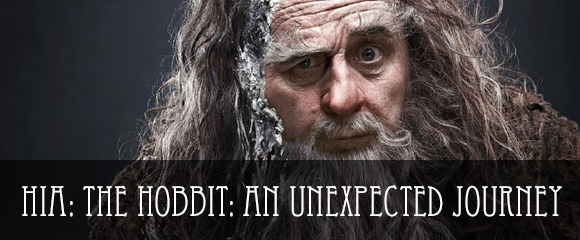
While writing this installment of Hell is Adaptations, I briefly entertained the perverse notion of splitting this into three, and bloating it with a lot of sidetracks and irrelevant nonsense. I’m sure you can see where this is going, yes? Peter Jackson’s film adaptations of the Lord of the Rings trilogy were serviceable, even though I think the material spiraled out of his control by the third movie, but with The Hobbit he stopped even pretending to respect the source material.
Jackson had originally pitched filming The Hobbit as the first part of a trilogy, with LOTR being adapted as the latter two parts. After a great deal of studio debate, New Line decided to fund a full LOTR trilogy, and The Hobbit got pushed onto the back burner. As it turned out, the LOTR films were a big hit financially, so talk about a Hobbit adaptation made quite the buzz even before the first trilogy had been fully released. Unfortunately for New Line, lawsuits concerning the earnings of the LOTR trilogy were filed both by Peter Jackson and the Tolkien Estate, causing the rights and financial prospects for the Hobbit film adaptation to be entangled by court intrigue for years.
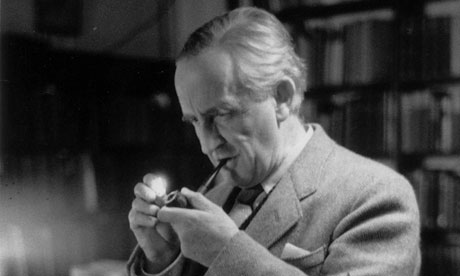
Burn, baby, burn.
By December 2007, New Line had settled matters with Jackson, hiring him on to executive produce a two-part adaptation of The Hobbit. Guillermo del Toro was hired in April 2008 to develop and direct the films, with pre-production and screenwriting beginning in August of that year. By late 2009 the legal difficulties with the Tolkien Estate had been taken care of, and development was heavily underway, with del Toro working on multiple drafts of the script alongside original trilogy writers Fran Walsh and Philippa Boyens, and with art, makeup, and model designs progressing nicely. The Mexican director had planned to heavily redesign many of the monsters from Jackson’s original trilogy, hopefully to add more eyes to their extremities. He had also planned to cast the larger-than-life actor Brian Blessed as Thorin Oakenshield, Ron Perlman as Beorn the Berserker Bear-Man (my title, not Tolkien’s), and Ian Holm as a much younger Bilbo Baggins.
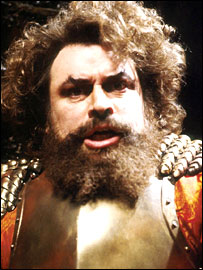
Weep for what might have been.
Sadly, it was not to be. In May of 2010, del Toro stepped down as director from the film, which by that time had surprisingly still not been greenlit by the studios. (It was being co-financed by New Line and MGM.) In October, Jackson was announced as director, and principal photography began in February 2011. In July 2012, Jackson confirmed plans to release The Hobbit as a trilogy rather than a two-part adaptation. The first film, The Hobbit: An Unexpected Journey, was released in December 2012 to mixed reviews but wild box office success.
What an unexpected journey, indeed.
Was the final result Heaven, or was it Hell? My opinion won’t be hard to guess, but just so you gentle readers don’t think I’m simply going to dump on Jackson (see title illustration), I will note briefly that I do not think that del Toro would have been a good choice as director. While I consider him to be a good art and makeup designer, his work in this area tends towards the disturbingly dark end of the spectrum, which I think would have been inappropriate for adapting a light children’s book. I do not, however, think that del Toro is a very good film director, if only because he seems like a sloppy storyteller who is uncertain if he wants his movies to be pop entertainment or symbolically dense art films. He has the same strengths and faults as Tim Burton, in these regards. Jackson, on the other hand, is competent at making pop entertainment, and I always thought he would have been better suited for directing The Hobbit than the more seriously adult Lord of the Rings.
I think, though, that financial considerations were far too important in the development of the Hobbit films. Simply put: There is no reason for The Hobbit to take up more than one film. The insertion of side-material from the LOTR appendices was artificial at best, and cynical cash-grabbing at worst. While a standalone film exploring Gandalf’s exploits against the Necromancer during his occasional departures from the Hobbit narrative could have potentially been interesting, the decision to weave this story into the novel’s destroys any sense of narrative coherency. In fact, those two imaginary standalone films are far more interesting to contemplate than the blended garbage we got.
The Hobbit is a complete story, with a beginning, a middle, and end. And no, each of those things does not require a 3-hour movie. Gandalf’s Adventures with Radagast (again, my title) could also have been a complete story, even with brief scenes from The Hobbit cut in, but instead those adventures are being interrupted with the story of a band of greedy dwarfs. The only reason to blend these two stories together is that the writers didn’t think Gandalf’s Adventures could stand on its own. The only reason to break this out into three films was the desire for more money. It surely wasn’t because there was a whole lot of story to tell. I think Jackson and New Line learned the wrong lesson from the greedy dwarfs.
Are there things to love in The Hobbit: An Unnecessarily Long Journey? Of course. The special effects are, for the most part, top-notch. Many of the new actors are great choices, especially Martin Freeman as Bilbo and Sylvester McCoy as Radagast the Brown. (Yes, I know that Jackson made Radagast into a pot-smoking weirdo, but that’s more or less how I always imagined him from the very brief description of the character in the books.) Benedict Cumberpatch will doubtless be great as both The Necromancer and Smaug. What else? All the other great things are just holdovers from the LOTR trilogy: most of the actors, the set designs, the wardrobe, the creatures, etc. If we just needed more of the same visuals, surely we could have simply played a video game.
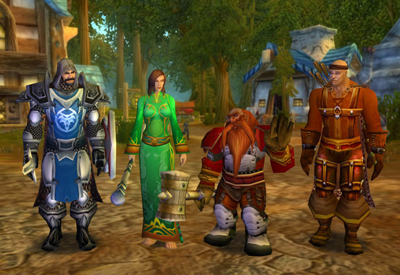
Eh, close enough.
What is The Hobbit about? It’s about a stuffy and selfish fellow having an adventure thrust upon him, and ultimately becoming a better, more magnanimous person because of it. What is An Unexpected Journey about? Hard to say. There’s a prologue about the dragon driving out Thorin and his dwarfs, claiming the story as theirs, not as Bilbo’s. Thorin even has an Orc arch-nemesis who he fights throughout the film, and will continue to do so in the sequels. Bilbo is basically a minor character in his own story, which is ironic since the film we’re watching is ostensibly the story as written down by Old Man Bilbo in Hobbiton. Thorin in the book is motivated by greed and power; here he is fueled by revenge and a need to prove himself. Somehow I doubt that the moral of the original story is going to survive intact. The insertion of Gandalf’s Adventures will water down the films’ unity even more, since the battle with The Necromancer will have almost zero impact on the story of Bilbo and the dwarfs. Heck, Thorin is so obviously the main character that I felt that even the Riddle Game was a distraction from the “real story.”
A good Hobbit movie may one day be made. It hasn’t happened yet, and since Jackson’s shapeless project is going to sprawl over the next two years, raking in the dough with royalties for many years to come, there will be little reason for a studio to make another attempt in the foreseeable future. Maybe a stage adaptation, though…



















 Full Details
Full Details
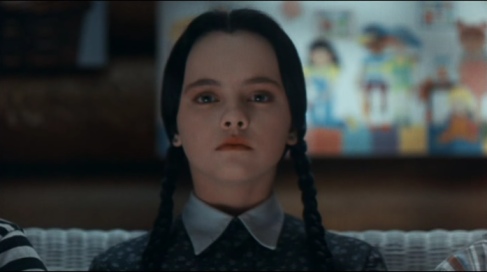


2 Comments
The stage adaptation has been done…by me. I was Gandalf in my middle school production. I’m sure they retired the script after us…
Lol.! Rich,I read LOTR about 10 times.Fearing the worst when the film version came out I avoided the cinema,then avoided the TV for years.Eventually I ventured to watch,and as expected very few of the characters fitted my own internal pictures,and I have been unable to return to the books ever since.I think of a character,and up pops the actor from the film. At least ,apart from some minor conflations of a few characters,the films were pretty faithful to the books.,and still I wasn’t keen.So there is no way whatsoever that I will see such a travesty as you have described!.When I lived in Africa under Idi Amin,soldiers robbed us of all my books,stored in a trunk which they must have thought was a treasure chest,The only book I came away from the country with was the Hobbit,so I have sentimental attachments,though I never enjoyed it as much as LOTR.However,it certainly doesn’t deserve to be cynically converted to a cash cow.What a pity.
Sorry, the comment form is closed at this time.